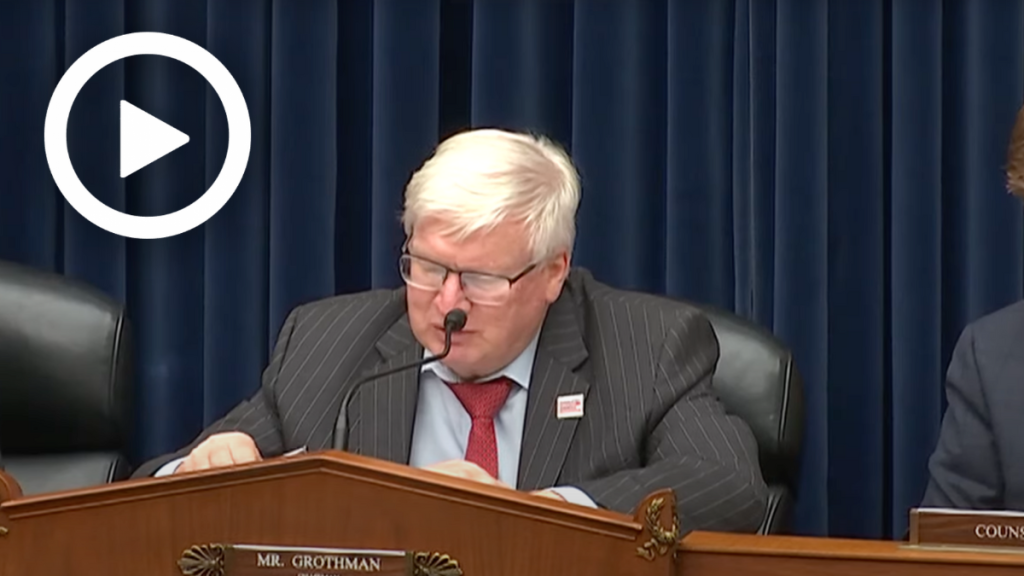Grothman Opens Hearing on Biden Administration’s Mismanagement of Foreign Aid
WASHINGTON—Subcommittee on National Security, the Border, and Foreign Affairs Chairman Glenn Grothman (R-Wis.) delivered opening remarks at a subcommittee hearing titled “Accountable Assistance: Reviewing Controls to Prevent Mismanagement of Foreign Aid.” In his opening statement, Subcommittee Chairman Grothman highlighted the need for mechanisms to oversee how American taxpayer dollars are being spent on foreign assistance. He continued by expressing how we cannot ignore the allegations of political abuse surrounding the Biden Administration’s use of foreign aid.
Below are Subcommittee Chairman Grothman’s remarks as prepared for delivery.
Good afternoon. I want to welcome everyone to this hearing before the Subcommittee on National Security, the Border, and Foreign Affairs.
Today’s hearing is an examination of concerns of waste, fraud, abuse, and mismanagement in America’s foreign aid.
I’d like to take a moment to thank our witnesses for being here today.
It is my hope that we can have a productive dialogue on the mechanisms needed to oversee how American taxpayer dollars are being spent on foreign assistance.
The World Bank estimates that twenty percent of foreign aid is lost to corruption each year, and that thirty percent of foreign aid fails to reach its intended target.
This Committee has a long history of conducting oversight into how few guardrails are in place when it comes to vetting contractors and grantees, leaving foreign assistance vulnerable to exploitation and undermining U.S. strategic goals.
Today, we will examine whether, and if so, how the U.S. government ensures that taxpayer-funded foreign aid achieves its objectives, while safeguarding these dollars from being diverted for unintended or unlawful purposes.
We will examine how USAID and the Department of State monitor and evaluate their programs to make sure they are meeting their intended goals.
Recently, the USAID Inspector General has cautioned that foreign aid going to Gaza and the West Bank is at extremely high risk of waste, fraud, and abuse.
In 2022 and 2023, the United States donated over $700 million to the United Nation’s Relief and Works Agency, an organization created and intended to provide humanitarian relief for Palestinians.
However, we now know that a Hamas compound was located under a UNRWA building in Gaza City.
Further, evidence has surfaced that some UNRWA employees participated in the devastating October 7th Hamas terrorist attack against Israel on Israeli soil.
Unfortunately, the Biden Administration had been sending taxpayer dollars to UNRWA since 2021 despite concerns that funds were being diverted to support terrorist activities.
That is why the previous Administration had withheld funding from UNRWA.
The Biden Administration unwisely reversed this decision.
And taxpayer dollars were released to UNRWA without adequate guardrails to ensure funds went to humanitarian relief, rather than Hamas terrorists, and were only paused again after reports about U-N-R-W-A’s support for terrorist activities surfaced a few weeks ago.
That is why I led a request with Chairman Comer and other Republican members of this Committee to Secretary Blinken requesting documents and information about the Biden Administration’s 2021 decision to restore funding to the UNRWA.
Understanding this decision will hopefully help us better understand if, and if so, how the Administration tracks foreign assistance dollars.
The Committee’s oversight of foreign assistance is critically important. Not only to ensure taxpayer dollars are being well-spent, but also to know whether the federal government is preventing foreign assistance from falling into the hands of terrorists or other malicious actors.
A recent poll conducted by the Associated Press found that 4 in 10 U.S. adults said foreign policy should be a top priority for the U.S. government.
That is twice as many who mentioned the topic on the same survey conducted in 2022.
This poll shows the increased anxiety the American people feel when it comes to how the U.S. conducts itself on the world’s stage.
Unfortunately, the Administration continues to make reckless decisions.
During his recent State of the Union address, President Biden announced plans for the U.S. military to build a temporary port to deliver humanitarian assistance to Gaza.
The President has decided to maroon approximately a thousand American uniformed men and women off the coast of Gaza to build—using taxpayer dollars—a supposed humanitarian aid port without providing assurances that Hamas will not attack our troops or those receiving the aid, or that Hamas will not divert that aid for its own evil purposes.
Foreign aid to Gaza is not the only area of foreign assistance that requires scrutiny here today.
The United States heavily relies on direct budget assistance to foreign governments.
It is vital that Congress and the Administration establish robust oversight mechanisms to prevent corruption and diversion of these funds.
Any assistance to Ukraine must be conditioned on the principle that they will allow full transparency, commit to tracking weapons and equipment, and open their books to the U.S. government.
Additionally, most of the money going to Ukraine flows through the World Bank and other public international organizations.
We owe it to the American people to demand greater accountability and transparency from multilateral organizations to ensure their operations align with our national interests and values.
Lastly, we cannot ignore the allegations of political abuse surrounding the Biden Administration’s use of foreign aid.
The politicization of aid distribution, including the imposition of conditions based on ideological agendas, including DEI goals and left-wing climate policies, threatens to undermine the credibility and effectiveness of our foreign assistance efforts.
Oversight of foreign assistance is not merely a matter of fiscal responsibility, but a reflection of U.S. strategic goals.
Today’s hearing represents an opportunity to identify shortcomings, propose reforms, and ensure that U.S. foreign aid serves as a force of good in the world.
I look forward to the insights and recommendations that will emerge from today’s discussion with our esteemed witness panel.
